Geography Curriculum Statement
"This school has a broad and ambitious curriculum. It is engaging and enjoyable, while providing pupils with the knowledge they need. Good use is made of the school’s local area, which provides unique curriculum experiences because of its rich history and geographical location." OFSTED October 2023
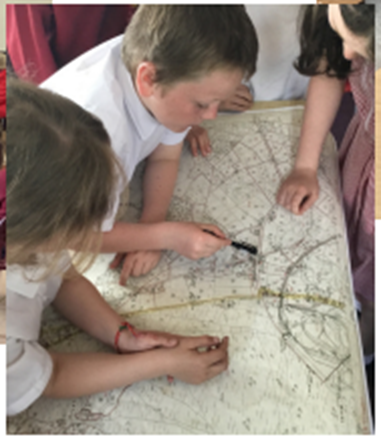

“The study of geography is about more than just memorising places on a map. It’s about understanding the complexity of our world, appreciating the diversity of cultures that exist across continents. And in the end, it’s about using all that knowledge to help bridge divides and bring people together.” Barack Obama
Intent
At Clee Hill Community Academy, we believe that it is important for all our children to consider themselves Geographers and to develop their curiosity of the world in which they live. We intend to equip children with geographical skills to develop their knowledge through studying places, people and natural and human environments. We encourage the children to not only think about the answers to questions posed to them but to also think about their own questions about the world we live in and to develop the skills to find the answers to these questions.

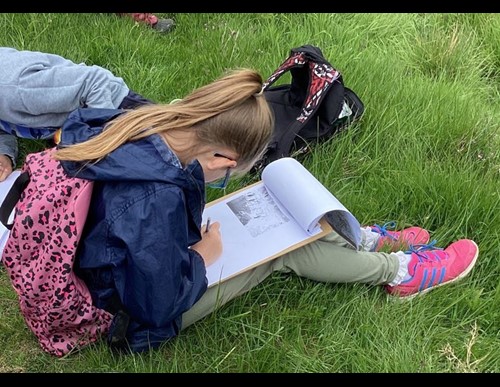
It is our intention that pupils become more expert as they progress through the curriculum, accumulating and connecting substantive and disciplinary geographical knowledge.
- Substantive knowledge- this is the subject knowledge and explicit vocabulary used to learn about the content
- Disciplinary knowledge– this considers how geographical knowledge originates and is revised. It is through disciplinary knowledge that children gradually become more expert by thinking like a geographer.
This ensures that pupils develop the knowledge, skills and understanding of the key geographical concepts of contextual knowledge, processes (both physical and human) and geographical skills ensuring that they achieve/exceed the aims of the National Curriculum for Geography.
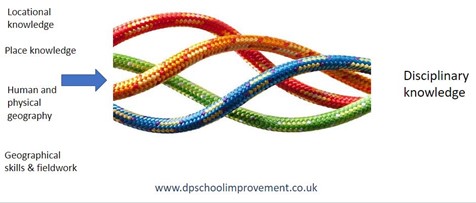
Copyright permission granted from Diane Pye for the use of this image.
Implementation
Substantive knowledge is organised into four interrelated forms locational knowledge, place knowledge and human and physical processes and geographical skills to ensure that pupils’ knowledge, skills and understanding are built upon through successive years towards clearly identified year group learning outcomes.
Locational Knowledge
Locational Knowledge is knowing 'Where's where' and why things are as they are. Locational knowledge helps pupils to understand relationships and gain a sense of place and connectiveness. Over time, pupils' locational knowledge will grow as they learn and remember more and become increasingly fluent in identifying specific locations. In our curriculum, locational knowledge is threaded through all units starting in the Early Years with learning more about their home and local environment and building up to upper Key Stage 2 where pupils can identify key features of the globe and their functions.
Place Knowledge
Place Knowledge supports pupils to locate or orient themselves, comparing areas both around the world and within the same continents, identifying similarities and differences. In our curriculum, pupils start by learning about their own locality including exploring features of Clee Hill Village, then comparing and contrasting with areas around the UK and the wider world.
Human and Physical Geography
As pupils' learning is built on through Key Stage 2, they start to identify and explain the similarities and differences of regions, including human and physical features and explain different settlements with relation to land use, trade links and how natural resources are distributed. Our Long Term planning and Geography Progression grid shows how this knowledge is built on over time.
Geography Skills and Fieldwork
Fieldwork combines knowledge with skill and requires children to think about what places are like and why, where places are and why, and how they connect to other places. Good fieldwork:
- allows pupils to enquire about places at first-hand
- requires pupils to use and practise a range of skills in a variety of contexts
- builds core knowledge and a sense of place
- has a strong spatial dimension and develops understanding of location
- revisits and investigates the same location over time, noting change and different aspects of place
- visits a range of places near and far and encourages children to look further and deeper
- develops creative and critical thinking
- builds on pupils’ own questions and ideas
- often has purposeful outcomes. (Geographical Association)
Every term, purposeful fieldwork is built into our Curriculum to enable pupils the opportunity to have first hand experiences as a Geographer. This may not appear to be a 'big trip' as traffic surveys, interviews with local residents and exploration of our locality are part of our curriculum. In addition, 'bigger' fieldwork explorations include the River Rea, Ynylas Dunes, Elan Valley, Ludlow Hydro Co-op and Titterstone Summit.
Our Geography Curriculum
Our Curriculum has been designed to be relevant to a changing world – with a focus on global awareness and empowering children with information about the environment which aims to prepare them to play their part in combatting climate change.
Becoming a ‘Geographer’ – developing disciplinary knowledge – is the living Geography which makes learning alive and relevant. It support and encourages curiosity about the wider world through an enquiry approach. Each unit contains elements of geographical skills and fieldwork to ensure that fieldwork skills are practised as often as possible.
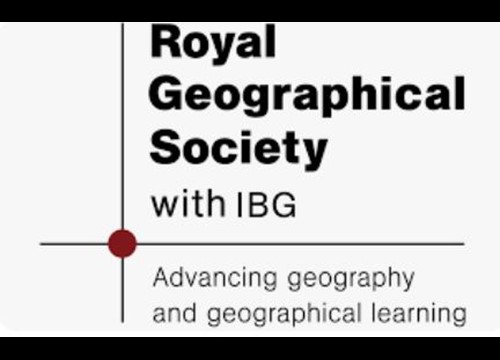
Geography is studied once per term over six lessons, alternating each half term History allows children to have a clear understand of what Geography is. Within a sequence of lessons, teachers check pupils understanding effectively, addressing any misconceptions swiftly and conversations surrounding their viewpoints take place. The curriculum is designed and delivered in a way that allows pupils to know more, find out information and remember more.
Although our curriculum is personalised to our school, we use resources to support our lessons from trusted sources such as the Royal Geographic society and the NFU.
The whole school Geography Overview works on a 2-year cycle.
|
Cycle A (2024-2025) |
Autumn |
Spring |
Summer |
|
Class 2 (Year 1 & 2) |
What's in my locality? Food and Farming |
Where is Clee Hill? Houses and Homes |
Where would I like to visit in the UK? Transport |
|
Class 3 (Year 2 & 3) |
Why do we live where we live? Local study - Ludlow |
Where does our water come from? Water, Water Everywhere |
How can we protect our marine biomes? Oceans and Seas |
|
Class 4 (Year 4 & 5) |
Can you take us on a journey around the world? Kensuke’s Kingdom |
Why is Antarctica uninhabitable for humans? Exploring your planet |
How does the sea shape our coastlines? Coasts |
|
Class 5 (Year 5 & 6) |
Why is York a tourist destination? Exploring York |
What is our relationship with the physical world?Deforestation & The Amazon |
Should we live in zones of earthquakes and volcanoes? Natural disasters |
|
Cycle B (2023-2024) |
Autumn |
Spring |
Summer |
|
Class 2 (Year 1 & 2) |
Why is the weather different across the UK? An Island Home |
Where would I take a tourist in Florida? A passport to Florida |
Where would I take a tourist in London? London - a city life |
|
Class 3 (Year 2 & 3) |
What’s in my local area? Local study – Clee Hill |
What is climate change and why does it matter? Caring for your World – Reduce, Reuse & Recycle |
How does trade connect us? Kenya |
|
Class 4 (Year 4 & 5) |
How do we energise our homes and country? Energy - fossil fuels and alternative sources |
Can you take us around Europe? Exploring France |
How does the weather affect tourism? Weather and Climate |
|
Class 5 (Year 5 & 6) |
How are mountains and rivers mapped? Raging Rivers and Mountainous Mountains |
What is our relationship with the physical world? All around the world |
What does Fair Trade really mean? The Amazing Americas |
Geography and the EYFS
‘From the early years, the geography content that children learn can allow greater awareness of people, the environment, the relationships between them and the child’s place in this relationship. This sense of belonging is recognised as being significant in children’s social and emotional development and in preparing them for more formal learning’ (Ofsted, 2021).

EYFS is the bedrock of the Geography curriculum and this is built upon in KS1 and KS2. Of the seven areas of learning and development outlined in the EYFS framework the one that fits best with Geography is ‘knowledge and understanding of the world’. However, pupils would not develop a knowledge and understanding of the world in isolation. Pupils learn a whole range of highly transferable skills, values and attributes (including: problem-solving, observation, collaboration, open-mindedness, courage, resilience, curiosity, integrity, and a sense of what is fair and equitable) that combine to allow them to explore and interpret the world around them. When providing a context for learning pupils can construct their own individual and collaborative learning story.
By learning ‘All About Me’, the concept of scale and cultural understanding and diversity can be introduced, as well as developing an awareness of their locality (school community). Cultural awareness and diversity is further developed through their learning on ‘Festival and Celebrations’ Geographical skills and fieldwork are introduced in the ‘Going on Bear Hunt’ and ‘Amazing Animals’ topic as pupils explore their local area and habitats.
and diversity can be introduced, as well as developing an awareness of their locality (school community). Cultural awareness and diversity is further developed through their learning on ‘Festival and Celebrations’ Geographical skills and fieldwork are introduced in the ‘Going on Bear Hunt’ and ‘Amazing Animals’ topic as pupils explore their local area and habitats.
Geography in the Early Years – The Geographical Association
‘A clearly mapped journey starting in the Early Years and developing through the curriculum is crucial if pupils are to move towards becoming experts in the subject’ (Ofsted, 2021).
Our ‘How the EYFS Curriculum supports Geography ‘ document shows our progression through the EYFS and into Year 1.
Our Early Years Curriculum
As part of our EYFS curriculum, there are milestones which have been carefully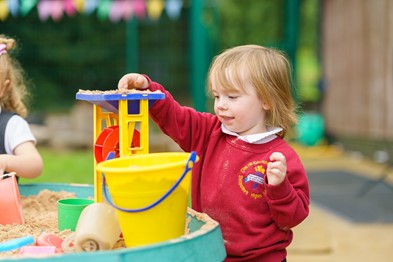 constructed with an end goal, to reflect our own dynamics and environment to meet our children’s needs, whilst ensuring a stimulating, challenging and diverse curriculum. Although many aspects of the Early Years Curriculum develop a solid understanding for Geography in Year 1, 'An Eager Explorer' is of particular importance to show the progression of learning through Nursery and Reception.
constructed with an end goal, to reflect our own dynamics and environment to meet our children’s needs, whilst ensuring a stimulating, challenging and diverse curriculum. Although many aspects of the Early Years Curriculum develop a solid understanding for Geography in Year 1, 'An Eager Explorer' is of particular importance to show the progression of learning through Nursery and Reception.
EYFS Curriculum milestones and goals
Supporting pupils with additional needs
Adapting the curriculum for pupils with SEND in geography may include some of the following considerations:
• For sensory or physically impaired pupils, geography learning may necessitate enlarging texts, using clear fonts, using visual overlays, or audio description of images.
• Dyslexic pupils may benefit from well-spaced print.
• Teachers identify and break down the components of the subject curriculum into manageable chunks for pupils who find learning more difficult, particularly those with
cognition and learning needs. These may be smaller ‘steps’ than those taken by other pupils to avoid overloading the working memory.
• A variety of additional scaffolds may be used in lessons, such vocabulary banks, additional visual stimuli or adult support.
Impact
The impact of our curriculum is that:
- Pupils have a secure geographical knowledge.
- Pupils confidently ask and answer questions about locations, including their physical and human characteristics.
- Pupils apply previously taught learning of key concepts to current learning.
- Pupil voice demonstrates that they enjoy geography and recall their learning over time.
- Pupils are aware of the damages being caused to the environment, as a result of climate change, and have a sense of responsibility for the care of the Earth and its people.
- Pupils are prepared for their next stage of education.

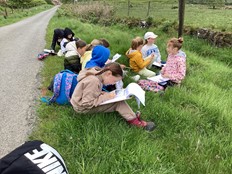
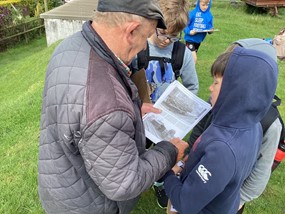 concepts. It sets out the substantive concepts that pupils should know and remember as well as the disciplinary knowledge to learn the practices of geographers. Our Geography progression grid shows the key knowledge for each year groups, the vocabulary that will be taught as well as the sequencing and progression disciplinary knowledge through practical activities and fieldwork.
concepts. It sets out the substantive concepts that pupils should know and remember as well as the disciplinary knowledge to learn the practices of geographers. Our Geography progression grid shows the key knowledge for each year groups, the vocabulary that will be taught as well as the sequencing and progression disciplinary knowledge through practical activities and fieldwork. Scientific Special Interest (SSI) with views overlooking from the Malvern Hills to the nightlights of Birmingham. Our surrounding area provides us with a wealth of Geographical opportunities to explore.
Scientific Special Interest (SSI) with views overlooking from the Malvern Hills to the nightlights of Birmingham. Our surrounding area provides us with a wealth of Geographical opportunities to explore.